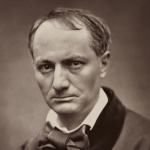Fear me, virgin whosoever
Taking pride from love exempt,
Fear me, slighted. Never, never
Brave me, nor my fury tempt:
Downy wings, but wroth they beat
Tempest even in reason's seat.
Behind the house the upland falls
With many an odorous tree—
White marbles gleaming through green halls—
Terrace by terrace, down and down,
And meets the star-lit Mediterranean sea.
‘Tis Paradise. In such an hour
Some pangs that rend might take release.
Nor less perturbed who keeps this bower
Of balm, nor finds balsamic peace?
From whom the passionate words in vent
After long revery's discontent?
“Tired of the homeless deep,
Look how their flight yon hurrying billows urge,
Hitherward but to reap
Passive repulse from the iron-bound verge!
Insensate, can they never know
’Tis mad to wreck the impulsion so?
“An art of memory is, they tell:
But to forget! forget the glade
Wherein fate sprung Love's ambuscade,
To flout pale years of cloistral life
And flush me in this sensuous strife.
’Tis Vesta struck with Sappho's smart.
No fable her delirious leap:
With more of cause in desperate heart,
Myself could take it—but to sleep!
“Now first I feel, what all may ween,
That soon or late, if faded e'en,
One's sex asserts itself. Desire,
The dear desire through love to sway,
Is like the Geysers that aspire—
Through cold obstruction win their fervid way.
But baffled here—to take disdain,
To feel rule's instinct, yet not reign;
To dote, to come to this drear shame—
Hence the winged blaze that sweeps my soul
Like prairie-fires that spurn control,
Where withering weeds incense the flame.
“And kept I long heaven's watch for this,
Contemning love, for this, even this?
O terrace chill in Northern air,
O reaching ranging tube I placed
Against yon skies, and fable chased
Till, fool, I hailed for sister there
Starred Cassiopea in Golden Chair.
In dream I throned me, nor I saw
In cell the idiot crowned with straw.
“And yet, ah yet, scarce ill I reigned,
Through self-illusion self-sustained,
When now—enlightened, undeceived—
What gain I, barrenly bereaved!
Than this can be yet lower decline—
Envy and spleen, can these be mine?
“The peasant-girl demure that trod
Beside our wheels that climbed the way,
And bore along a blossoming rod
That looked the sceptre of May-Day—
On her—to fire this petty hell,
His softened glance how moistly fell!
The cheat! on briers her buds were strung;
And wiles peeped forth from mien how meek.
The innocent bare-foot! young, so young!
To girls, strong man's a novice weak.
To tell such beads! And more remain,
Sad rosary of belittling pain.
“When after lunch and sallies gay
Like the Decameron folk we lay
In sylvan groups; and I—let be!
O, dreams he, can he dream that one
Because not roseate feels no sun?
The plain lone bramble thrills with spring
As much as vines that grapes shall bring.
“Me now fair studies charm no more.
Shall great thoughts writ, or high themes sung
Damask wan cheeks—unlock his arm
About some radiant ninny flung?
How glad with all my starry lore,
I'd buy the veriest wanton's rose
Would but my bee therein repose.
“Could I remake me! or set free
This sexless bound in sex, then plunge
Deeper than Sappho, in a lunge
Piercing Pan's paramount mystery!
For, nature, in no shallow surge
Against thee either sex may urge,
Why hast thou made us but in halves—
Co-relatives? This makes us slaves.
If these co-relatives never meet
Self-hood itself seems incomplete.
And such the dicing of blind fate
Few matching halves here meet and mate.
What Cosmic jest or Anarch blunder
The human integral clove asunder
And shied the fractions through life's gate?
“Ye stars that long your votary knew
Rapt in her vigil, see me here!
Whither is gone the spell ye threw
When rose before me Cassiopea?
Usurped on by love's stronger reign—
But, lo, your very selves do wane:
Light breaks—truth breaks! Silvered no more,
But chilled by dawn that brings the gale
Shivers yon bramble above the vale,
And disillusion opens all the shore.”
One knows not if Urania yet
The pleasure-party may forget;
Or whether she lived down the strain
Of turbulent heart and rebel brain;
For Amor so resents a slight,
And hers had been such haught disdain,
He long may wreak his boyish spite,
And boy-like, little reck the pain.
One knows not, no. But late in Rome
(For queens discrowned a congruous home)
Entering Albani's porch she stood
Fixed by an antique pagan stone
Colossal carved. No anchorite seer,
Not Thomas a Kempis, monk austere,
Religious more are in their tone;
Yet far, how far from Christian heart
That form august of heathen Art.
Swayed by its influence, long she stood,
Till surged emotion seething down,
She rallied and this mood she won:
“Languid in frame for me,
To-day by Mary's convent-shrine,
Touched by her picture's moving plea
In that poor nerveless hour of mine,
I mused—A wanderer still must grieve.
Half I resolved to kneel and believe,
Believe and submit, the veil take on.
But thee, arm’d Virgin! less benign,
Thee now I invoke, thou mightier one.
Helmeted woman—if such term
Befit thee, far from strife
Of that which makes the sexual feud
And clogs the aspirant life—
O self-reliant, strong and free,
Thou in whom power and peace unite,
Transcender! raise me up to thee,
Raise me and arm me!”
Fond appeal.
For never passion peace shall bring,
Nor Art inanimate for long
Inspire. Nothing may help or heal
While Amor incensed remembers wrong.
Vindictive, not himself he’ll spare;
For scope to give his vengeance play
Himself he'll blaspheme and betray.
Then for Urania, virgins everywhere,
O pray! Example take too, and have care.



















Comment form: